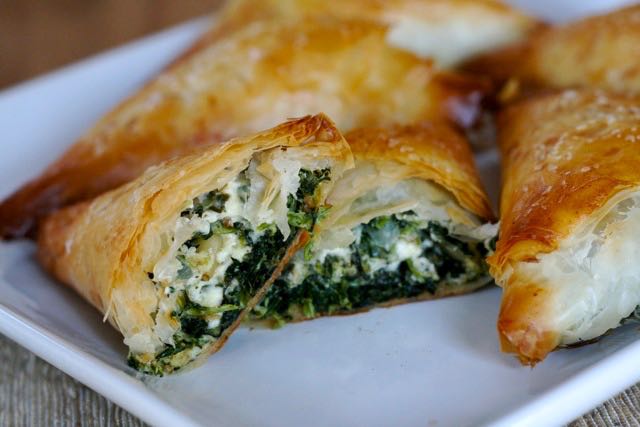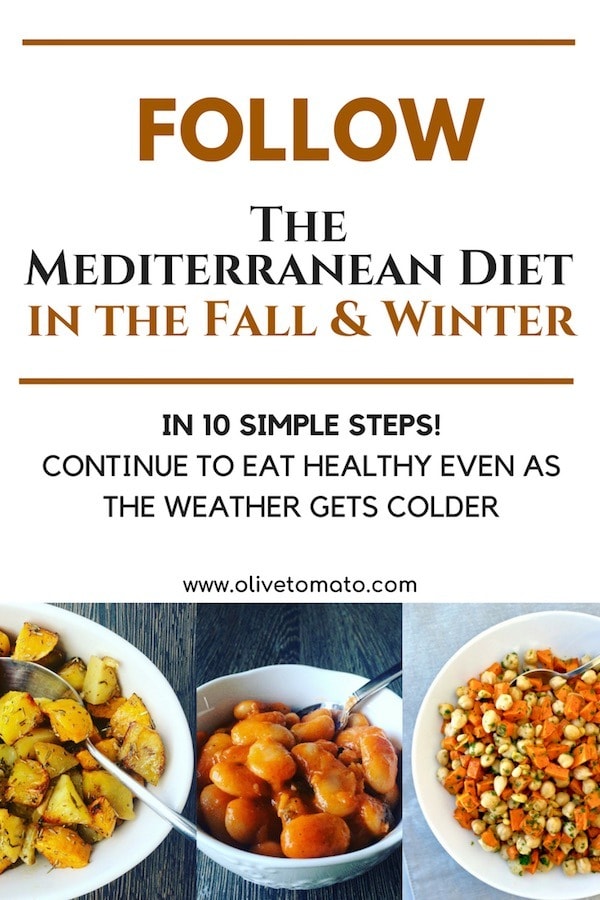How to Follow the Mediterranean Diet During Fall and Winter in 10 Simple Steps

Many of us associate the Mediterranean diet with summer, sea and sun. Sure, it’s easy to eat more fruit and vegetables when it’s hot out, but what happens when fall and winter come along? The rainy days, the cloudy skies, the longer nights… we want more “warm” foods, more comfort foods, more starch. It’s easy to fall back on bad habits and eat less vegetables, more meat and more junk food. But have no fear, these tips will help you stay healthy by using the Mediterranean diet as a guide. After all, winter comes to the Mediterranean as well. Did you know that 80% of Greece is mountainous? It gets pretty cold here too. Here’s what we eat:
1. Go with the Season
As the seasons change, so should our diet. Apart from the flavor as well as environmental issues, eating in season guides us to eating a variety of fruit and vegetables. I avoid produce that is not in season even though it is available at my local grocery store. For example tomatoes are available year round, but they certainly do not taste good. As a reminder, I keep a list of fruit and vegetables and their peak seasons on the refrigerator and check it before I go shopping.
2. Beans are Your Friend
Beans are an important part of the Greek-Mediterranean Diet. Traditional ways of preparing them are in the form of thick soups such as this lentil soup or roasted beans. You can also consume them as a salad using olive oil and lemon as a dressing. Beans are often also cooked together with fish.
3. Cruciferous Vegetables the Greek Way
A popular Greek winter dish is cauliflower cooked in the pot with tomato paste and olive oil, we eat it once a week during winter. You can also try it roasted. Broccoli also is great roasted with pine nuts and olive oil. You can also roast any type of root vegetable in olive oil, combine with some feta and bread and you have a complete meal.
4. The Right Salads
Forget the Greek salad when Fall comes along. The Greek salad is as a good as the ingredients you use. A Greek salad made with pale wintery tomatoes is very unappetizing and does a disservice to this wonderful salad. Instead, make traditional Greek winter salads using romaine lettuce along with spring onion with olive oil and vinegar or cabbage salad that is made with shredded cabbage, carrots, a touch of garlic and an olive oil-lemon dressing.
5. Potatoes, Not Just on the Side
Potatoes are always used to accompany meat but they are often made on their own such as the traditional Greek potato salad or potatoes with celery.
6. Go Green(s)
Greens also know as horta are often consumed in the winter. There are different varieties available in all seasons. Find what is available in your area, lightly boil them, add a splash of lemon juice, olive oil and enjoy them with a chunk of feta and bread. Traditionally, vegetables are also cooked together with rice with dishes such as spinach-rice or leek-rice or even cabbage-rice. The vegetables and rice are cooked together and served with olive oil and lemon (and feta).
7. Pies Can Be a Complete Meal
Pies known as pites in Greek, are savory pies made with phyllo and usually a vegetable filling. Pites are ideal to use those winter vegetables. Not only are they fairly easy to make as you can find phyllo almost everywhere plus they last for days and freeze well. These can be a complete meal. Popular winter pies include the famous spanakopita, hortopita (pie with greens), pumpkin pie, leek pie and onion pie.
8. Frozen Vegetables and Canned Tomatoes
During the winter frozen vegetables and stewed tomatoes or tomato paste play an important role in my kitchen. I occasionally will make Greek style lathera green beans and peas using frozen vegetables. At that point I will also use preserved tomatoes or tomato paste. Tomato paste in fact was also consumed regularly as part of the Mediterranean diet. Studies have shown that frozen vegetables maintain their nutritional value as they are frozen shortly after harvest. However, when you go with frozen, use only plain frozen vegetables, not a frozen meal which is often loaded with extra fats and other ingredients you don’t want to be eating.
9. Fruit
Again, seasonal fruit is key. Sliced apple, sections of oranges and mandarins are what you usually find on the Greek table in the winter months. You can also opt for some dried fruit such as dried figs, apricots and prunes (dried plums).
10. Drink your Herbs
Greeks are known for drinking a lot of herbal teas during the cold months. Some of our favorites include chamomile, Greek mountain tea (tsai tou vounou), sage and linden. These teas are consumed sometimes with a bit of honey.
Photo by Annie for flickr


Love this website, I am new in the Mediterranean diet. A lot of interesting info. I will try the recipes soon. And I also like you on Pinterest. Everything is explained clearly and understandable! Greetings from the Netherlands.
I love this website….very informative! I can hardly wait to try some of these recipes! I am new to the Mediterranean diet.
I am eating Vegan and find it easy to adapt the recipes and I love that.. In the beginning some years back it was hard to find foods Vegan style and as time went on I started finding some of the foods I liked were Vegan by default.. I have recipes for making cheese also, at first they were pretty pricey but then I guess some one figured out that some people have Nut allergies and started making cheese without nuts.. Okay at first things didn’t taste right but with the right herbs and spices you can’t tell the difference.. Love your recipes and will make more and more.. Making the Chickpeas, rice and Tahini today, use tons of EVO, although sometimes I saute my onions in water rather than EVO.. Thanks for this site
I’ve been wanting to eat this way for a long time. I cannot eat strong cheeses like Feta, Parmesan, Bleu cheeses. What would you suggest? It has to be fairly mild. thanks!
I am new here, and just starting this, I see tomatoes , what about ketsup? mustard? Mayo? vinegar? I must go to the store and get the herbs esp. oregano what about green tea? regular tea? oh I will be asking questions for sure.
Mary, forget ketchup and mayo, do not use them at all. Mustard can be used on some dishes and vinegar (also balsamic)is fine too.
You can drink any tea you like but here in Greece we prefer chamomile and mountain tea, you can simply go outside and gather it.
A small note about chamomile is that it seems it reduces blood pressure, so many people do not consume a lot during the day (mostly women)
Hi Judy,
When you get your head around the benefits of the Med. diet – I suggest you read as much as possible about Greek or Cretan diet and start to really think about it. You will never look at junk food again. If you want a long healthy life then just do it. Think about natural home cooking with:-
(1) Loads of veg especially tomatoes (tinned are OK) not forgetting to add garlic and onions.
(2) Oodles and oodles of Extra Virgin Olive Oil – early harvest is the best (read up on this) Also note that in a recent taste study (reported in the UK) two of the cheapest turned out to be in the best 12 tasted.
(3) Herbs and spices (include Balsamic vinegar although this is a condiment)
(4) Read a book called “The Greek Doctors Diet” ISBN 1-4050-7749-2 I found this in a second hand book shop. Published in 2005 and just as relevant today.
(5) Last but not least genuine Feta cheese. This is one of the delights of Greece.
On a personal note I eat this with a Greek meal and home made 100% Rye bread.
(6) One last thing – it’s best to keep red meat as a side dish. Chicken and turkey are O.K.
Eat loads of sustainable fatty fish – salmon, mackerel and especially sardines are my favourite. I have fish every other day. Scrambled eggs and smoked salmon for breakfast with a squeeze of lemon is very nice. Don’t forget natural yoghurt which is really easy to make at home.
Hope this helps.
Roger
I am trying to convert from eating the traditional American food and snacks to the Mediterranean diet and am grateful for these clues as to winter dining. I just love this website and look forward to the regular emails with the hints and recipes.
Great Judy! Glad you find the site useful. There are plenty of articles that provide tips as well as easy recipes to help you transition toward a Mediterranean diet with a Greek focus.